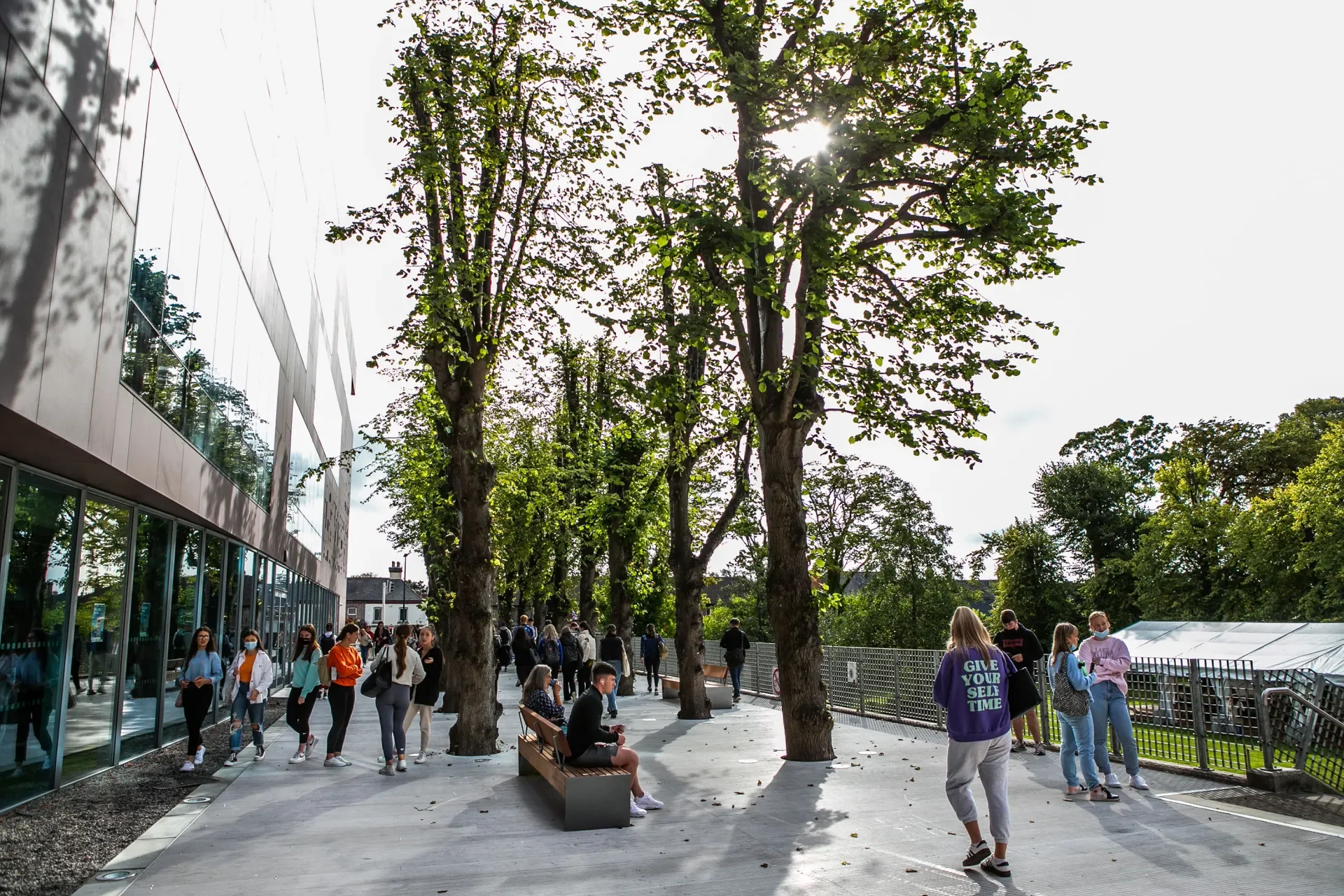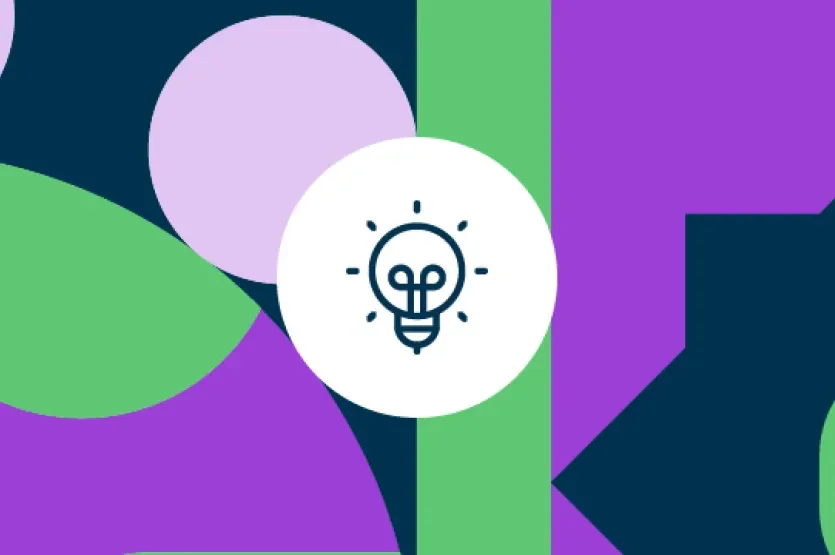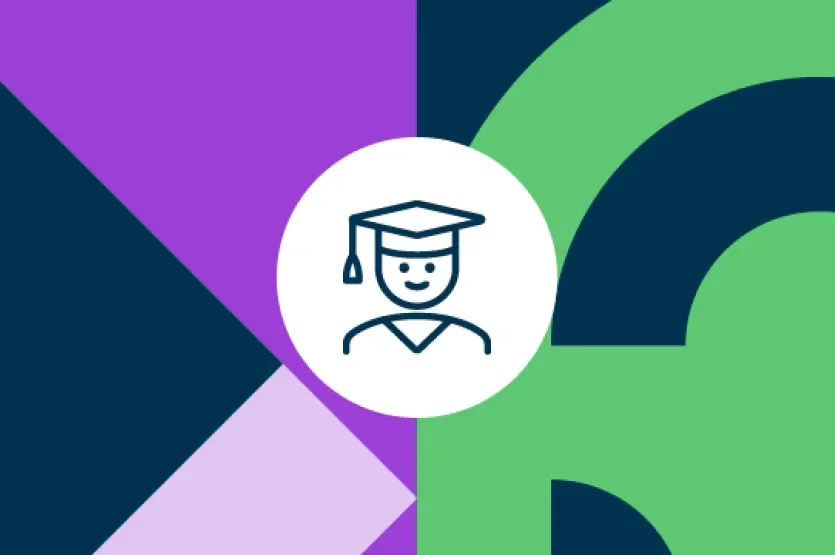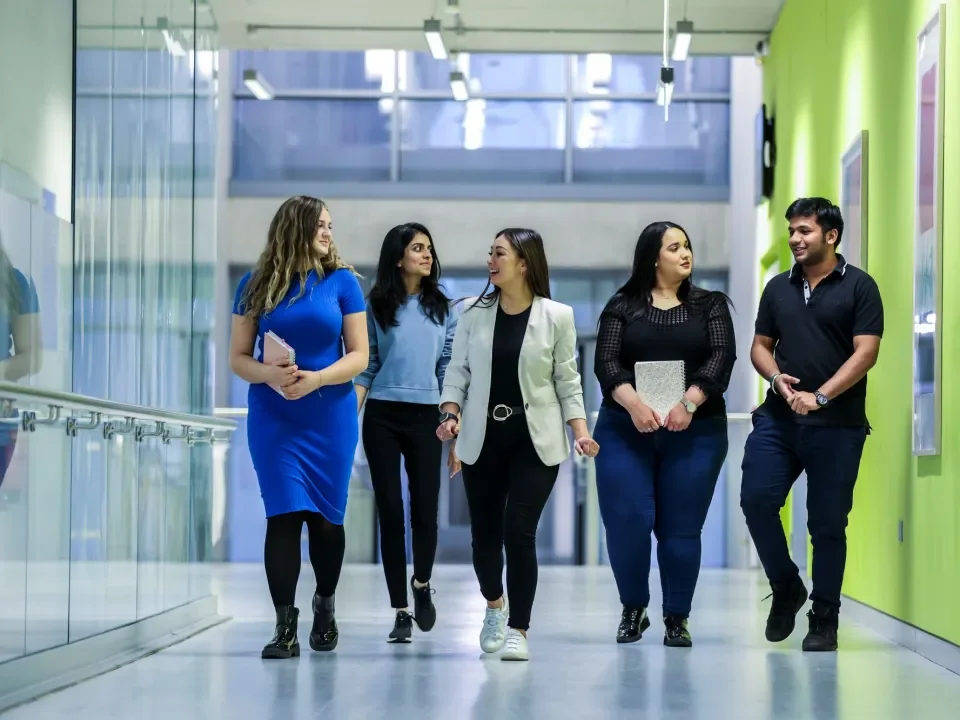Overview
In the first year of this programme, you’ll study a specialist area covering digital learning, leadership and education, physical education, religious education or social, personal and health education and wellbeing. You’ll dedicate your second year to a supervised thesis.
Grow your skills in a dynamic environment
The course encourages you to reflect on your own practice and thinking, while gaining a better understanding of educational research and theory. You’ll also benefit from a diverse intake of students and a dynamic learning environment. Modules are delivered in-person and online, so you can study from anywhere in the world.
Once you graduate, you’ll be the ideal candidate for principal or leadership roles in primary and post-primary schools, educational inspector roles or educator positions in higher education institutes.
Why DCU
DCU People
Careers & Further Options
Careers
The Master of Education programme is designed to meet the professional and personal needs of teachers and educators. The programme is intended for those who wish to make a significant contribution to the enhancement of professional practice in their chosen special option by reviewing and systematically applying appropriate theories and research to their professional practice.
Entry Requirements
Applications are welcomed from all those working in education settings:
• Candidates are required to have a Level 8, Lower Second Class Honors Degree, minimum H2.2.
• Candidates may be interviewed for places.
Due to the specialist nature of this programme, additional criteria may be used to assess suitability to undertake this programme. For further information, please contact the Programme Chair using the contact details above.
International Applications
International candidates are expected to have educational qualifications of a standard equivalent to those outlined above. In addition, where such candidates are non-native speakers of the English language they must satisfy the university of their competency in the English language. For further information on international applications click here.
Programme Structure
The MEd is a two year part time programme.
In the first year students undertake three core modules (Online) and three modules in their chosen special option.
In the second year of the programme students undertake a thesis with the support of a supervising tutor.
The programme commences in late September. Students will study two modules in semester one and four modules in semester two.
All taught modules will be completed by June, and the minor thesis will be submitted by June. Lectures take place on Tuesday and Thursdays. Each module consists of 21 contact hours.
Typically there is one assignment per module. In the main, this is an extended essay of approximately 5,000 words but may vary depending on the special option in question.
There are also two additional courses in Academic Writing and Competency in ICT that are completed on a Pass/Fail basis.
The pedagogical approach is interactive, hands-on and participative. It is intense and enjoyable. Informal and formal dialogue while working with peers in small groups forms an important dimension of the experience.
The three core modules will be delivered fully online in an interactive and engaging environment so do not require students to be on campus. Special option modules will be online for Educational Leadership, and Teaching and Learning. STEM Education modules will be delivered on campus and online. Poverty and Social Inclusion in Education modules will be delivered fully on campus.
Exit route: Postgraduate Diploma in Advanced Educational Studies
Those students who, for any reason, do not wish to continue to the thesis on the MEd. programme may, after satisfactorily passing all the six taught modules, apply to exit with a Post-graduate Diploma in Advanced Educational Studies.
MEd in Leadership and Education is for teachers at all levels who seek, or are currently in, leadership roles.
This programme offers participants the opportunity to undertake a general study of the theory and practice of educational leadership. Its aim is to enable participants to understand and critique theories and practices of educational leadership in light of both current research and professional experience. The integration of theory and practice is fundamental to the course.
Module 1: Unpacking Leadership
The question is deceptively simple: What is a leader? Is that the person who runs things? Some may answer “no, that is the boss”. Is the boss a leader? The minimum definition of a leader is someone with followers.
School leadership is a comparatively recent topic for discussion, debate and research in education.
Various leadership theories exist from the ‘Great Man Theory’ of the sociologist Max Weber to the behavioural theories of Skinner which suggests that leaders are what leaders do.
A variety of definitions of leadership exist and many researchers talk about leadership but fail to define it, taking for granted that leadership means the same to everyone.
The purpose of this first module is to begin to understand leadership and to explore how in the domain of education that it is frequently allied to and interlocks with school management and school administration.
Module 2: Leading in Climate of Accountability: Effective/Good Schools – How we create and sustain them?
As part of recent reform efforts, in the context of PSDT, WSE, School Self Evaluation and School Improvement Plans, increasing demands for internal and external accountability are evident within primary and post-primary education in Ireland. While such demand has not, as yet, reached the same tempo as in other jurisdictions it is important and timely to scrutinise these developments critically and to examine their implications for school leadership, as well as staff relations and continuing professional learning and the level of the school. The impact of accountability measures on the quality of teaching and learning will be assessed, and the potential impact on professional trust and professional relations, as well as with parents and the school community, will be held up to critical scrutiny.
Module 3: Leadership in Action
This module introduces the concept of change management and its place within educational leadership. This is linked to the challenges facing schools today and ways in which the educational landscape has changed over the last fifty years. This module looks at the different ways in which leaders can bring change about in their institutions and how this links to the different kinds of contexts that you can find in modern schools. This module explores concepts of middle leaders, leading professional learning communities, mentoring, coaching and sustainable leadership.
The MEd special option provides three complementary perspectives on teaching and learning that enable practitioners to gain a deeper understanding of their everyday work in schools.
First, the sociological lens prompts teachers to consider the issues presented to them in their classroom that may be within or outside their locus of control.
Psychology provides the second avenue to teaching and learning, and addresses how teachers may apply psychological theories to implement transformational strategies in their classrooms and schools. Finally, the module on teacher identity requires teachers to consider how their personal experiences, relationships and societal influences shape who they are and consequently, how they teach.
Module 1: Sociological aspects of Teaching & Learning: Education, Equality and Social Justice
This module will critically examine sociological aspects of teaching, learning and achievement with particular reference to education, equality and social justice. The module draws on both theoretical and empirical work to explain and highlight the unequal experiences and achievement of individuals and groups in the educational context. There will be a particular emphasis on inequality in the following contexts: Parental involvement in schooling; Social class and theories of capital; Constructs of intelligence and implications for learners; Gender and education; Race, ethnicity and interculturalism.
Module 2: Psychological aspects of Teaching & Learning
How job satisfaction fits with other concerns about teaching, including staying in teaching and children’s learning will be addressed in this module. Links between self-esteem, self-efficacy and job satisfaction will be explored together with various factors that determine self-esteem. This module will also examine psychological perspectives on pupil behaviour (including motivation to learn and theories on learning) and their relevance for understanding and managing behaviour in the classroom. Participants will be enabled to develop a structured approach to preventing and tackling emotional and behavioural problems and engaging pupils in their learning activities by drawing on one or more of the psychological perspectives.
Module 3: Teacher Identity and Popular Culture
This module will examine historical and ongoing influences on identity formation particularly as they relate to the identities of teachers and educators in Ireland. The intersection of teacher identity with teachers’ positioning in terms of teaching and learning will also be examined from critical, historical, comparative, virtual and other perspectives. Participants will be enabled to articulate theoretical perspectives on identity formation and re-formation. An integral aspect of this module will be the development of a framework for analysis of aspects of teacher identity through its representation in various policy documents, literature, research reports and various print and digital fora.
This option will enable you to develop your understanding, knowledge and skills in global citizenship education, in formal and informal educational settings. The course is targeted at teachers, school leaders and other education practitioners who wish to respond to global and justice issues with creative and culturally relevant practices. It empowers teachers and learners to engage reflectively and critically with issues such as: climate change, human rights and democracy, migration and sustainability. In your second year, you will undertake research relating to global citizenship education.
Special Option Coordinator: Rowan Oberman
Module 1: GCE foundations and frameworks (Maria Barry)
This module will explore theories and concepts that underpin Global Citizenship Education at national and international levels, tracing the lineages and core pillars of this multidisciplinary field. It will support participants to consider national and international related policies and frameworks and to apply those to their own educational contexts. Drawing on research and practice in the related fields of development education, citizenship education and anti-racism education, the module will consider the cognitive, social-emotional and behavioural dimensions of GCE and underpinning and crosscutting themes and pedagogy. Students will engage in reflective, dialogic and critical approaches, ensuring participants have opportunities to explore their own perspectives and experiences of global justice issues related to GCE, in addition to critically examining the role of education, schools and teachers in bringing important, yet complex, local and global justice-based issues to classrooms.
Module 2: Children's rights and human rights: A framework for education (Ben Mallon)
This module offers the opportunity to develop your understanding of how international human rights frameworks influence the lives of children and young people and frame local and global approaches to education. Through an engagement with contemporary issues and the latest research in the field, the module will explore multiple perspectives on human rights and children’s rights. It considers how international human rights frameworks, such as the United Nations Convention on the Rights of the Child, have implications for developing classroom practice, managing educational organisations such as schools, and for organising education systems as a whole. Using active and participatory methodologies, this module investigates the synergies between children’s rights education and social constructivism. It explores concepts such as child-led learning and enquiry-based learning as approaches offering authentic contexts for children’s decision-making. The module provides a critical exploration of the different models of child participation such as student councils and green school committees. The module models rights-based practice which can inform the planning, practice and promotion of children’s rights in education settings.
Module 3: Climate change education (Rowan Oberman)
Climate change presents an urgent and existential crisis intersecting with other ecological, societal and political global issues. Education is recognised as fundamental in realising strategies for adaptation and mitigation and transitioning to a sustainable society. Recent curricular and community initiatives see the increasing development of climate change education programmes and scholarship. This module explores methods of engaging learners, at different levels and in different contexts with the complexity, challenges and dilemmas raised by climate change. Climate change raises difficult and discomforting questions: questions which can implicate our lifestyles, project devastation, churn feelings of injustice and highlight uncertainty about the future. Students will explore approaches to climate change education which facilitate meaningful and empowering engagement with these questions and which build resilience. Climate change education is approached holistically and is understood as encompassing understanding, skills, values and action components. The module will be taught through participative, cooperative, creative and reflective activities which model the climate change education approaches being proposed. The module will explore the policy context and current examples of climate change education practice, in informal and formal settings, nationally and internationally and discuss key considerations relating to the development of climate change education programmes.
Fees and Funding
Fees
How To Apply
How to Apply
All Applicants must apply through DCU's Student Application Portal which is available here. Here's a quick step by step guide if you need help with your application.
- Certified academic transcripts for each and every year of study, with certified English translations if applicable.
- Personal statement of 250 words maximum outlining your reasons for applying.
- Non Native English Speakers - Evidence of English competency which meets DCU entry requirements. Please see the below below for more details: https://www.dcu.ie/registry/english-language-requirements-non-native-speakers-english-registry
Non-EU applicants :
- If you require a study visa and are a Non EU student, you should take an online Special Option. (Study visas
are only granted for full-time programmes)
All entry requirements should be met before the commencement of the programme.
Applications Closing Dates:
30th May 2025
Application Queries
For EU applicant queries, please visit https://www.dcu.ie/registry/eu-postgraduate-taught-admissions or email postgraduateadmissions@dcu.ie
For non EU applicant queries, please visit https://www.dcu.ie/registry/international-admissions-undergraduate-and-postgraduate or email internationaladmissions@dcu.ie
Life On Campus
At DCU, our students can expect a unique campus experience. We are known for our excellent teaching and learning facilities, our active clubs and societies, and our great social and sporting facilities. All this makes DCU an exciting place to be.
DCU has three academic campuses; Glasnevin, St. Patrick’s and All Hallows (both in Drumcondra), all close to Dublin City centre.
They can be reached by public transport, Dublin Bus and Bus Éireann, with our Drumcondra campuses a ten minute walk from Drumcondra Train Station. Glasnevin is a 20 minute walk from St Patrick’s and All Hallows. They are also linked by Dublin Bus.
Each campus has a library (O’Reilly, Cregan and Woodlock Hall), study spaces, restaurants, and on-campus residencies. There are sports facilities on Glasnevin and St. Patrick’s, and there is a dedicated sports campus, St Claire’s, located near Glasnevin on the Ballymun Road.
DCU’s 19,000 students have access to exceptional teaching and learning facilities across our three academic campuses.
These include modern learning theatres, research centres, a new media and TV studio, radio/podcast studios, computer suites and advanced labs in the areas of Languages, Engineering, Physics, Chemistry and Biotechnology, as well as a Sports Performance centre and a training hospital ward. In 2021, we opened our first virtual reality ‘Leadership Lab’, which is located in our Business School.
We continue to improve and update our facilities. For example, construction of a new world-class STEM facility is underway on the Glasnevin campus. With capacity for an extra 3,000 STEM students, this facility will advance DCU’s international reputation for excellence in science and health, computing and engineering disciplines.
Studying in DCU isn’t just about course work. The university is rich in student life and activities.
There are more than 140 clubs and societies for students in DCU, with ‘Clubs & Socs’ days taking place on both the Glasnevin and Drumcondra campuses at the start of the academic year. They span everything from rugby to rock climbing, anime to jazz.
For many students, sport is an important part of the DCU experience. DCU’s Sports Complex boasts a 25 metre swimming pool, fitness centre gym, all-weather pitches and squash courts, as well as soccer, GAA and rugby pitches. DCU Dóchas Éireann, the university’s GAA club, is the largest third level Gaelic Games club in the country. Meanwhile, DCU Athletics has been Ireland’s highest achieving university club for many years. And DCU has dozens of other clubs to get involved in, from Archery to Weightlifting.
The Glasnevin campus is home to our purpose built, state-of-the-art student centre, The U, which serves the needs of a rapidly growing student body. Here, you will find the Student Leadership and Lifeskills Centre, performing arts and cultural spaces for students and the wider community, and the Entrepreneurship and Innovation Hub. Also located on our Glasnevin campus is The Helix, our renowned performing arts centre.
On our St Patrick’s campus, we have the Java Student Hub, a vibrant, warm and welcoming space where students can meet for coffee, play music, use the projector to watch events, or just relax. The walls of the Java Hub were designed based on the cultural history of St Patrick’s Campus, including the special references to the notable sporting history and history of the arts.
We have a number of academic, professional and social supports for students.
Student Advice & Learning Skills Centre - Offers a wide range of supports and services to students and advice
The Writing Centre - drop-in writing workshops for students through the academic year
Maths Learning Centre - provides maths support for students of all ability levels with maths modules
Student Learning - facilitate the transition from passive to active learning for students at DCU, by teaching study skills, nurturing critical thinking and building student confidence.
Careers work with students to help them on their professional journey into graduate employment.
Our student support team offers a comprehensive support programme, helping students make that all important transition into university life and focusing on building confidence and skills which are key to success at third level.

DCU St Patrick's Campus
FAQs
What courses are offered by the DCU Institute of Education?
DCU Institute of Education brings together students of education and provides a rich menu of undergraduate courses across all sectors from early childhood, to primary and post-primary and further and higher education. We offer a range of taught and research postgraduate courses at doctoral, masters, diploma and certificate level and have a distinguished record in providing continuing professional development.
Is there Garda vetting for students who study DCU Institute of Education courses?
Garda vetting is required for all students who have unsupervised access to children and vulnerable adults as part of their studies at DCU. Applicants must successfully pass the Garda vetting process in order to complete the registration process.
What are the potential teaching pathways for primary, post-primary and further education and training offered by DCU?
Primary Teaching Pathways
Undergraduate*
Postgraduate**
- Professional Master of Education (Primary Teaching) - DC970
* Please ensure that you consult minimum entry requirements and CAO points for all undergraduate programmes
** Please ensure that you consult minimum entry requirements for all postgraduate programmes
Post-Primary Teaching Pathways
Undergraduate*
- Bachelor of Religious Education & English or History or Music - DC010 | DC011 | DC012
- Bachelor of Education in Gaeilge and French or German or Spanish - DC013
- Bachelor of Education in Technology, Engineering and Graphics - DC015
- Bachelor of Science (Hons) in Science Education - DC203
- Bachelor of Science (Hons) in Physical Education with Biology - DC205
- Bachelor of Science in Physical Education with Mathematics - DC206
Postgraduate**
- Professional Master of Education (Post-Primary Teaching) - DC905
* Please ensure that you consult minimum entry requirements and CAO points for all undergraduate programmes
** Please ensure that you consult minimum entry requirements for all postgraduate programmes
Further Education and Training Teaching Pathways
Undergraduate*
- BSc (Hons) in Education and Training (Further, Adult and Continuing Education) - DC235
* Please ensure that you consult minimum entry requirements and CAO points for all undergraduate programmes









